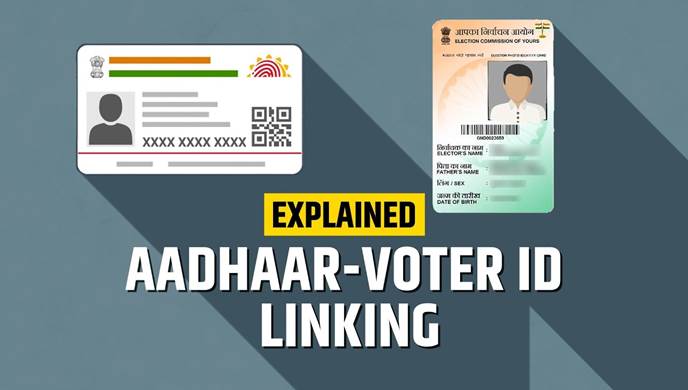Description

Copyright infringement not intended
In News
- The Supreme Court of India has issued notice to the Union Government on a petition challenging the power of the Election Commission of India (ECI) to link the Aadhaar database with voter ID cards.
- The petition challenged the constitutional validity of the Election Laws (Amendment) Act, 2021 that amended the Representation of People’s Act, 1950 and the Representation Act, 1951 to implement certain electoral reforms, including Aadhaar-Voter Card linkage.
Background
- The Indian Parliament passed the Election Laws (Amendment) Act 2021 to amend the Representation of the People Act, of 1950 and the Representation of the People Act, of 1951 to implement certain electoral reforms.
- The 1950 Act provides for the allocation of seats and delimitation of constituencies for elections, qualifications of voters, and preparation of electoral rolls.
- The 1951 Act provides for the conduct of elections, and offences and disputes related to elections.
Key features of the Election Laws (Amendment) Act 2021
- Linking Voter list with Aadhaar
- The electoral registration officer may ask a person to provide their Aadhaar number for verifying their identity.
- If their name is already on the electoral roll, then the Aadhaar number may be required for authentication.
- Persons will not be refused inclusion in the electoral roll or have their names deleted from the roll if they are unable to furnish an Aadhaar number.
- Such persons may be permitted to furnish alternate documents prescribed by the central government.
- Date for enrolment in Voter list
- Under the 1950 Act, the qualifying date for enrolment is 1st January of the year.
- The 2021 act amended the earlier provisions and provide 4 qualifying dates in a calendar year: January 1, April 1, July 1, and October 1 to enrol under the voter list.
- Gender equality
- The 1950 Act permits service voters, such as members of the armed forces or central government employees posted outside India.
- The 1951 Act enables the wife of a person holding a service qualification to vote either in person or by postal ballot.
- The recent amendment replaces the term ‘wife’ with ‘spouse’ in both the Acts.
The argument in Favor of Aadhar-Voter ID Linkage
- The Election Commission conducts regular exercises to maintain an updated and accurate voter list.
- As part of this exercise, the officials weed out duplication of voters.
- Linkage of Aadhaar with voter IDs will ensure that only one Voter ID is issued per Indian citizen and will also upload the constitutional principles of “One Person-One Vote”.
- At the end of 2021, 99.7% of the adult Indian population had an Aadhaar card. This range exceeds any other officially valid document such as driver’s licence, ration cards, PAN cards etc.
- Aadhaar allows for biometric authentication, Aadhaar authentication and verification are considered more reliable, quicker and cost-efficient.
Concern
- This goes against the verdict of the Puttaswamy case (Right to Privacy).
- The preference for Aadhaar to decide valid voters is confusing as an Aadhaar is only a proof of residence and not a proof of citizenship.
- This could solve the problem of duplication of voters but it will not remove voters who are not citizens of India from the electoral rolls.
- Error rates in the biometric-based authentication system. As per the Unique Identification Authority of India in 2018, Aadhaar-based biometric authentication had a 12% error rate.
- The Supreme Court of India stated in Puttaswamy's judgement that a person would not be denied benefits in case Aadhaar-based authentication could not take place.
- This concern is also valid in the case of using Aadhaar as a tool to clean electoral rolls.
- Several social activists and civil society have raised concerns that linking electoral rolls and Aadhaar could lead to the violation of the right to privacy and encourage surveillance measures by the government

Way Forward
- Aadhaar card for authentication or verification must not violate individuals' informational autonomy (right to privacy), People must have the right to decide which official document they want to use for verification and authentication.
- In Lal Babu Hussein (1995), the Supreme Court held that the Right to vote cannot be disallowed by demanding only limited identity proof, voters can use any other identity proof to practice their right to vote.
- Election Commission and Government need to address the concerns related to “the Violation of Right to Privacy and creation surveillance state”, the government also need to enforce data protection principles that regulate how official data will be used.
- Other means of verification and authentication must be allowed if the person does not hold an Aadhaar card.
https://indianexpress.com/article/explained/why-a-petition-in-the-supreme-court-is-challenging-the-aadhaar-voter-id-card-linkage-8243283/
https://t.me/+hJqMV1O0se03Njk9













